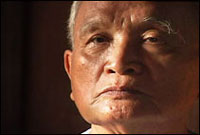Former Khmer Rouge leader to go on trial for slaughtering 1.7 million Cambodians
The highest-ranking former Khmer Rouge leader still alive said Thursday he is ready to face an international tribunal examining the deaths of 1.7 million Cambodians under the party's radical policies during its 1975-79 rule.

Prosecutors submitted a secret list Wednesday of five former top Khmer Rouge leaders to stand trial along with the evidence to back the charges. Judges will decide whether to proceed with indictments.
"They didn't specify the names of the people, but I know I'm included," former chief Khmer Rouge ideologue Nuon Chea told The Associated Press at his home in northwest Cambodia near the border with Thailand on Thursday.
Cambodian and international prosecutors submitted evidence including thousands of pages of documentation and the locations of more than 40 mass graves.
"I will go to the court and don't care if people believe me not," Nuon Chea said. "It happened 30 years ago and it's very difficult to remember. Some of them (tribunal members) never experienced that. They weren't there, how could they know what was going on?"
The prosecutors' announcement that they had submitted the evidence Wednesday is "a turning point of the tribunal" that victims of the Khmer Rouge have long awaited, said Youk Chhang, director of the Documentation Center of Cambodia, an independent group collecting evidence of the regime's atrocities.
"Things are moving along right now. There remains hope that justice will prevail," Youk Chhang said.
A statement from the tribunal said the prosecutors - a joint Cambodian-foreign team - submitted 25 cases to the judges involving "murder, torture, forcible transfer, unlawful detention, forced labor and religious, political and ethnic persecution."
All five suspects were senior leaders, it said.
The late Khmer Rouge leader Pol Pot died in 1998 and his former military chief, Ta Mok, died in 2006.
Nuon Chea, former Foreign Minister Ieng Sary and former head of state Khieu Samphan live freely in Cambodia but are in declining health.
Kaing Khek Iev, who headed the Khmer Rouge's S-21 torture center, is the only former senior official in government custody.
The move by the prosecutors came about a year after Cambodian and foreign judicial officials took their tribunal posts.
Cambodia first sought U.N. help in 1997 to set up a tribunal, but it took years of tough negotiations - with Cambodia saying it was concerned about its sovereignty - before the two parties signed a pact in 2003 agreeing to hold trials.
Trials were originally expected to start this year but bickering between Cambodian and foreign judges over procedural rules delayed the process.
The tribunal announced Wednesday that a detention facility at its headquarters, about 18 kilometers (11 miles) west of Phnom Penh, is ready to hold any defendants.
Subscribe to Pravda.Ru Telegram channel, Facebook, RSS!




